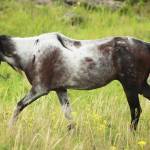Management of Older Horses

Basic management is much the same for horses of any age: owners need to provide suitable forage and feed, access to clean water, an appropriate level of exercise, and veterinary attention to maintain health. In senior horses, however, these steps need to focus as much on prevention of problems as on maintenance of health. Lapses in management may allow older horses to develop conditions that are difficult to treat and may limit the horse’s comfort and usefulness.
Older horses sometimes begin to lose weight, and if this is a slow and gradual decline, owners may not notice the change until the horse has become quite thin. A thin horse has more trouble staying warm in cooler seasons, and the energy spent in shivering may accelerate weight loss as temperatures drop. One thing that can help to prevent weight loss is keeping the horse’s mouth and teeth in good condition, so regular dental checkups should be scheduled at least once or twice a year. Pain from broken teeth, gum infections, or sharp dental points can make a horse reluctant to chew hay or grain. Keeping teeth in good condition allows the horse to chew forage thoroughly, minimizing the risk of choke.
Chewing the tough fiber in poor-quality hay is difficult for any horse, and especially for those whose teeth are in less than perfect condition. Owners should consider buying a better grade of hay to provide nutrients for older horses from a more digestible source. A fortified feed will supply vitamins and minerals as well as calories to prevent weight loss. For horses that can’t consume enough hay and grain to maintain body condition, the addition of oil or another fat source can provide a concentrated source of energy. A consultation with an equine nutritionist can provide answers to specific questions about feeding senior horses.
Vaccinations should be kept up to date for senior horses, even if these animals never leave the farm and are not in regular work. Not all diseases are spread by contact with other equines, so horses are at risk for some illnesses regardless of whether or not they regularly go to shows or trail rides. It’s also important to remember to deworm older horses as needed to minimize damage to the digestive tract. Routine fecal egg counts can help you understand your horse’s parasite status, develop, and evaluate the efficacy of your deworming program.
All horses need exercise, and lots of pasture turnout is a good way to guarantee they will continue to move around. Keeping an older horse stalled can lead to increased stiffness, swelling of the legs or stocking up, and loss of muscle tone. On the other hand, energetic younger horses may bully the seniors in a herd, running them to exhaustion and blocking their access to water and ground-fed hay piles. Older horses may need to be pastured with one or two quiet companions to avoid injuries and weight loss caused by aggressive animals. Pastures, fences, gates, and stalls should be checked for any hazards, and dangerous spots should be fixed before horses are given access to them.
Owners will probably notice sudden changes in an older horse’s health, but it may be harder to see conditions that develop more slowly such as an irregular gait, a change in posture, or indications that the horse doesn’t see or hear as well as it used to. Having a veterinarian perform “well-horse” examinations once or twice a year can bring these signs to light and determine what is causing them. Problems that are identified early in their course can sometimes be treated or managed to keep them from progressing.








